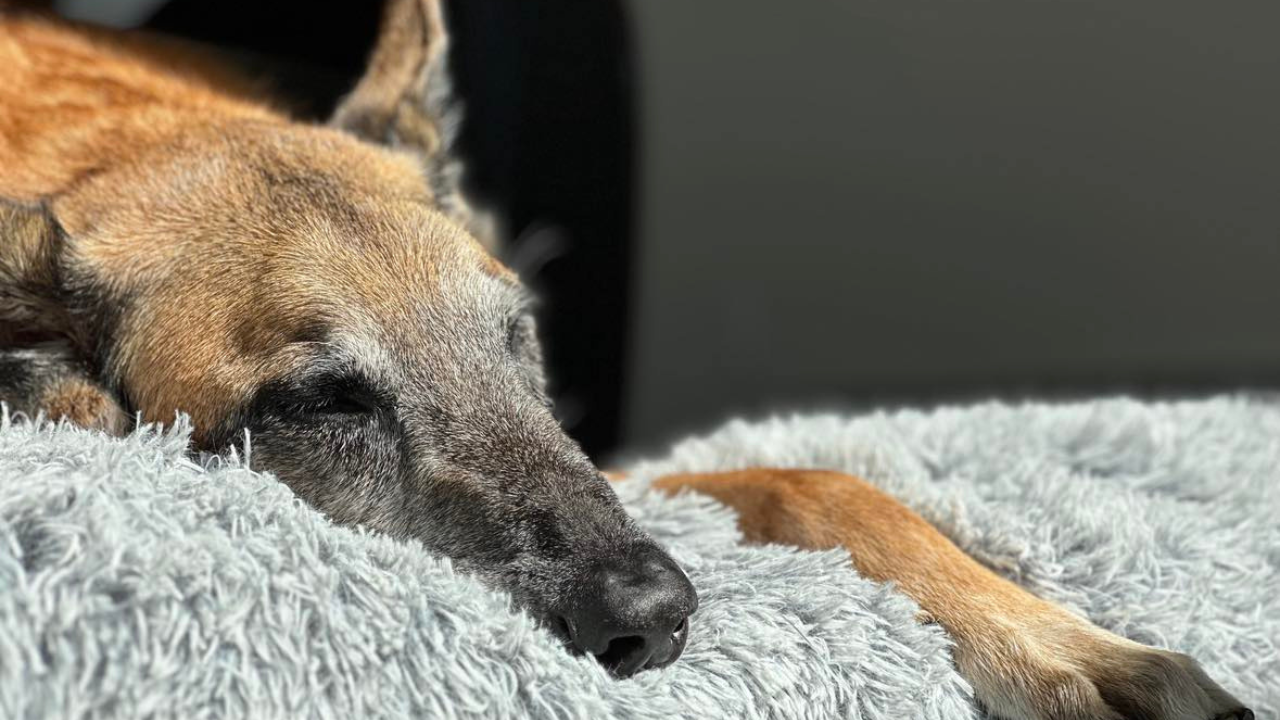Sleep Matters: The Missing Link in Your Dog’s Recovery
Aug 17, 2025
When we think about recovery for our sport and working dogs, most people immediately think about things like massage, supplements, hydration, and structured rest days. But one of the most powerful, and most overlooked, recovery tools is something far simpler: sleep.
Sleep isn’t just about being well-rested. It’s the time when the body repairs itself, the nervous system resets, and healing happens. If you’re not intentionally supporting your dog’s sleep, you may be missing one of the most critical elements of canine recovery.
Sleep: The Foundation of Recovery
Recovery isn’t just what happens in the minutes or hours after a training session. It’s what happens overnight, too. During sleep, the body undergoes critical physiological processes that restore and strengthen muscles, reinforce neural pathways, and boost the immune system. Just like in human athletes, sleep is essential for peak performance.
Lack of sleep or poor-quality sleep can:
- Weaken the immune system
- Increase risk of injury
- Impair focus and learning
- Interfere with emotional regulation
- Increase behavioral issues like reactivity, anxiety, or aggression
Sleep restriction has even been shown to result in sensorimotor impairments, slower response times, and difficulty coping with new or stressful situations.
How Much Sleep Do Dogs Really Need?
Research shows the amount of sleep dogs need can vary widely depending on age, breed, fitness level, activity level, and even gender. Some dogs may only sleep 7–8 hours per day, while others may require upwards of 16 hours, especially if they are recovering from strenuous activity.
Researcher Ivana Gabriela Schork and her colleagues (2022) found the average amount of daily sleep in dogs was around 10.1 hours, but that older dogs tend to nap more frequently and for shorter periods during the day. Female dogs, interestingly, rebounded more effectively after sleep deprivation, with longer stretches of slow-wave sleep and better overall sleep quality than their male counterparts.
That means sleep isn’t just a number, it’s about quality, too. Longer, uninterrupted sleep appears to be particularly important for recovery.
What Affects Canine Sleep?
Sleep is affected by a variety of factors that you might not immediately consider. These include:
- Feeding frequency and timing
- Environment and routine
- Exercise and physical fatigue
- Mental stimulation or stress
- Human presence or disruptions in the household
Kennel environment, travel, unfamiliar settings, or disruptions in schedule can all interfere with your dog’s ability to get restorative sleep. For working and sport dogs, these disruptions can be especially common during competition weekends or long travel days.
Why Sleep Matters More After Hard Training
After a challenging training day, your dog’s body is working overtime to repair micro-damage to tissues, regulate hormones, and restore glycogen levels. Sleep is when much of that work happens. Skimp on sleep, and you’re skimping on recovery.
Signs that your dog may not be getting enough sleep:
- Slower recovery between sessions
- Difficulty focusing during training
- Seeming more "touchy" or emotionally reactive
- Regression in performance or obedience
- Decreased energy one or more days after training
What You Can Do to Support Better Sleep
Here are a few ways to support quality sleep and make it a central part of your recovery plan:
- Create a Consistent Sleep Routine
Dogs are creatures of habit. Keeping a consistent bedtime, wake-up time, and quiet period during the day can help regulate their internal clock and improve sleep quality.
- Provide a Comfortable Sleep Environment
Make sure your dog has a quiet, dimly lit space where they can sleep undisturbed. This is especially important in multi-dog homes or during travel and competition weekends.
- Protect Their Downtime
Avoid overstimulation right before bed. Just like us, dogs need time to wind down. If your evenings are high-energy or unpredictable, your dog may struggle to fall into deep, restorative sleep.
- Observe and Adjust
Pay attention to your dog’s behavior and energy levels. If they seem slow to recover or are showing signs of poor performance, don’t just blame the training session. Ask yourself if they’re getting the sleep they need, and the quality they need.
Closing Thoughts
Sleep is not a luxury. It’s a performance tool and essential for life. If you're looking to improve your dog’s recovery, reduce the risk of injury, and help them feel and perform their best, make sleep a priority in your training program.
Training doesn’t end when the session is over. The real gains often happen during rest, and that starts with sleep.
So, before you jump to supplements or advanced recovery tools looking for a “quick fix,” ask yourself the simplest question: Is my dog getting enough sleep?
Erica Boling, PhD
Passionate about fitness?
Want to become a Certified Canine Athlete Specialist (CCAS)?
Check our our online Elite K9 Athlete Program!
https://elitek9athlete.com/
Stay connected with the latest fitness news and updates!
Complete the form below to receive your FREE Canine Fitness Planning Guide and video! We'll also keep you up-to-date on our latest fitness news and workshops!
We hate SPAM. We will never sell your information, for any reason.


